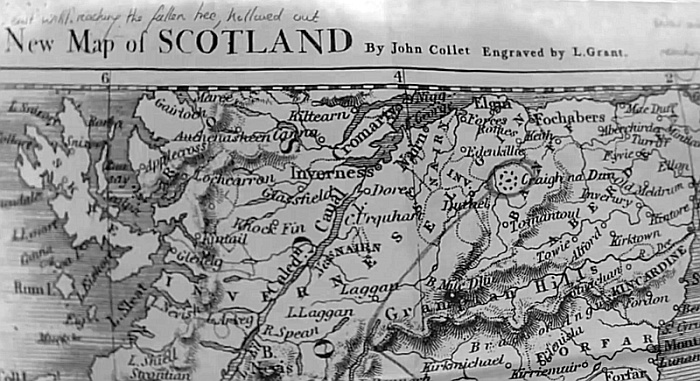
| Whilst there is much to praise, in the acting and the continued high production values, there is no doubt that this season has been the worst for audience response. I suggest why, in the hope that it improves the next series. |
| There is a core audience with Outlander, consisting of both book and non-book readers. I might be in between: I saw series one, two and three on purchased DVDs before I read book one and later two through like a book. I have read into the next two books, which I also purchased. Upsetting the core audience is only going to lose viewers, because few others join several series on. This is the same with the books: I know those who gave up after four - and I might well be one of them. I bought Series 4 DVDs and so script and comment impressions have been replaced by viewing. |
| Some of the disappointment is because of departures from the book, such as Brianna back in time no longer being misunderstood as a man, or even as Jamie, on the horse (wearing breeks, standing tall), and not even meeting the family at Lallybroch. The worst change seemed to be ignoring the book's emotional highlight of Jamie and Claire being present at the birth of Brianna's baby. |
| This is not the main issue with me. Adaptations are going to make changes, but when there is an adaptation it needs to a) respect and maintain the integrity of past adaptations and b) needs to be consistent with itself as the story develops. There are two broad areas to consider. Serious plot holes existed that did not allow suspension of disbelief because 1) they clashed with past knowledge from the three previous series, and affected the integrity of seasons two and three in particular, and 2) because they present problems later in the narrative. |
| therefore, comparison with the book is only to consider the television series story, not to prefer the book as such. |

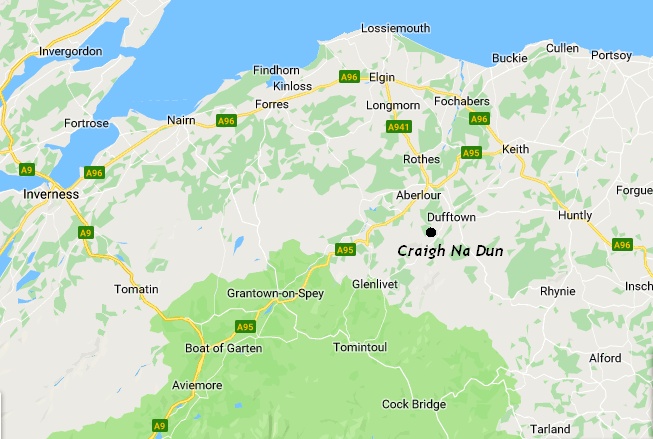
| Where is Craigh Na Dun? We now have a map, in season four. These stones keep moving! In series 2 episode 13 they were a gallop from Culloden with the sound of gunfire audible. On her second honeymoon and on arrival into the past, first time, the first series tells that Claire could view Inverness from the locality, once with its post Second World War street lights flickering (not exactly today's powerful street lamps), and then she is confused into 1743/ 4 as she sees nothing at night. In book 3, as Claire returns into 1766 twenty years on, we read that Craigh Na Dun is forty miles or so from Inverness by foot, no more than an hour by car in 1968, for her then to then get her stagecoach to Edinburgh. This compares with 68 miles to Fort William and 103 to Aberdeen! In the first book, Frank and Claire walk to the stones from Inverness, and later Claire goes by bicycle. In the TV series the police find the car; in the book it's a bicycle, although in book 2 the bicycle becomes a car and Geillis records in Book 4 that Claire Randall left a car. Then, at last, in series 4 episode 7 Brianna has a map, and Craigh Na Dun is 55 miles away by modern car, and is not an hour away by car but nearer an hour and a half! So the TV series now contradict themselves as do the books. |
| So far the television series had not made the mistakes as in the books. To move the stones in the books from Roger's school-days tryst in a lunch hour near Inverness High School to forty miles away is careless. To move them 55 miles seems reckless. Let us suppose for a minute that Craigh Na Dun has moved to where they are on Brianna's map. Where then is Lallybroch, and therefore Broch Mordha, and, critically, Balgriggan, where Laoghaire lives? In my imagination, Lallybroch used to be a little east and south of Craigh Na Dun and all that, going into the hills, guarding a mountain pass somewhat upwards in a northerly direction. I got this wrong, and I don't mean Lallybroch as portrayed in the TV series with its artificial mound behind it in an area of flat land by an unseen river. Perhaps it is down the Great Glen; again the books suggest that the Fraser lands and Mackenzie lands (Castle Leoch) border about east of Loch Ness, under which there is another time portal for many tens of millions of years (book only). Indeed, in the first British book, but not the TV series where the stones ahead of her, Claire makes a considered run for the Great Glen, as that will lead her to Craigh Na Dun near Inverness. In the first American book Craigh na Dun is three miles due east of Fort William! This makes no sense at all. Either one is not correct according to Brianna's map. So Lallybroch and accompanying places are likely to the south west of Inverness. Even in television terms, the stones could not move to deliver Brianna to a remote mountain side so that she considers taking a trip to the American colonies from Ayr because Roger went through the same stones leaves from Inverness! |
| This location of sites matters because in an unbelievably silly fall, to sprain her ankle, and fall down the hill, Laoghaire picks up and rescues Brianna and Brianna wakes up at Balgriggan. What was Laoghaire doing at least two mountain ranges away? How come a sprained ankle causes Brianna to pass out? |
| It is a cheap plot device: sprained ankles are very uncommon and passing out as a result (even with a hill fall) is more than uncommon. Explanations come in the deleted scenes of her being robbed by an Irish family, but a deleted scene is like a part of a book edited out. It's gone and does not exist. Too many Irish 'baddies', like the ethnic stereotype Stephen Bonnet (more on him later), may be the reason for removal of one bunch, or time constraints, but once it is gone it is gone. And even then they would not transport Brianna so far. The secondary argument against Brianna going to Lallybroch, as Laura Donnelly was unavailable to play Jenny, was that Brianna wanted to go directly to a port (Ayr?) but then the sprained ankle was the writers' device to slow her down to hang about at Balgriggan! It is ridiculous. |
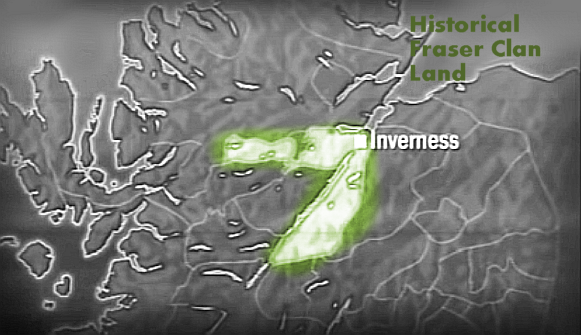
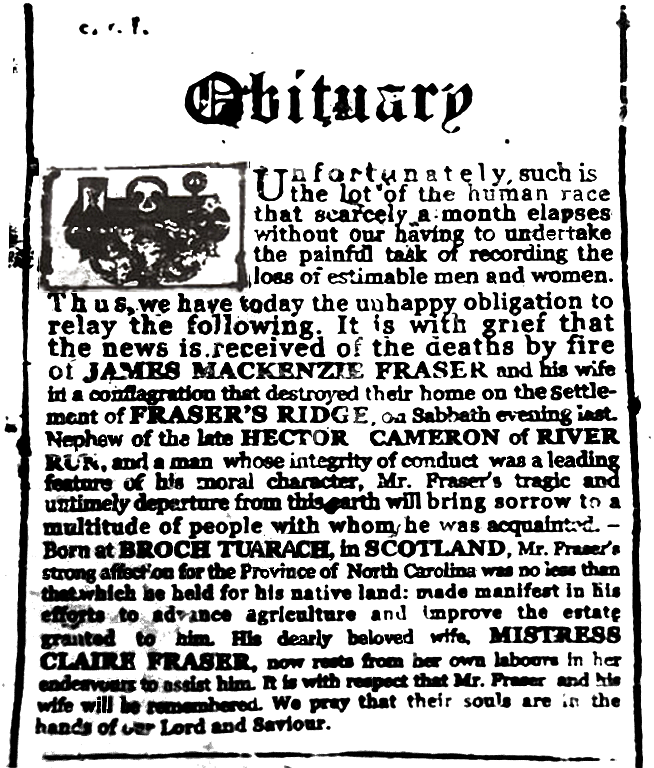
|
Obituary in the Wilmington Gazette [Television Version, dated 21 January 177?] Unfortunately, such is the lot of the human race that scarcely a month elapses without having to undertake the painful task of recording the loss of estimable men and women. Thus, we have today the unhappy obligation to relay the following. It is with grief that the news is received today of the deaths by fire of JAMES MACKENZIE FRASER and his wife in a conflagration that destroyed their home on the settlement of FRASER'S RIDGE, on Sabbath evening last. Nephew of HECTOR CAMERON of RIVER RUN, and a man whose integrity of conduct was a leading feature of his moral integrity, Mr. Fraser's tragic and untimely departure from this earth will bring sorrow to a multitude of people with whom he was acquainted. Born at BROCH TUARACH, in SCOTLAND, Mr. Fraser's strong affection for the Province of North Carolina, was no less than that which he held for his native land: made manifest in his efforts to advance agriculture and improve the estate. His early beloved wife, MISTRESS CLAIRE FRASER, now rests from her own labours in her endeavours to assist him. It is with respect that Mr. Fraser and his wife will be remembered. We pray that their souls are in the hands of our Lord and Saviour. |
|
A small notice from a newspaper, printed on February 13, 1776, in the American colony of North Carolina, in the town of Wilmington. [Gabaldon, D. (1994), Drums of Autumn, Arrow Books, Penguin Random House, 458.] It is with grief that the news is received of the deaths by fire of James MacKenzie Fraser, and his wife, Claire Fraser, in a conflagration that destroyed their house in the settlement of Fraser's Ridge, on the night of January 21st last. Mr. Fraser, a nephew of the late Hector Cameron of River Run plantation, was born at Broch Tuarach in Scotland. He was widely known in the colony and deeply respected; he leaves no surviving children. [Found in] 1906... Songs and Ballads of the Eighteenth Century |
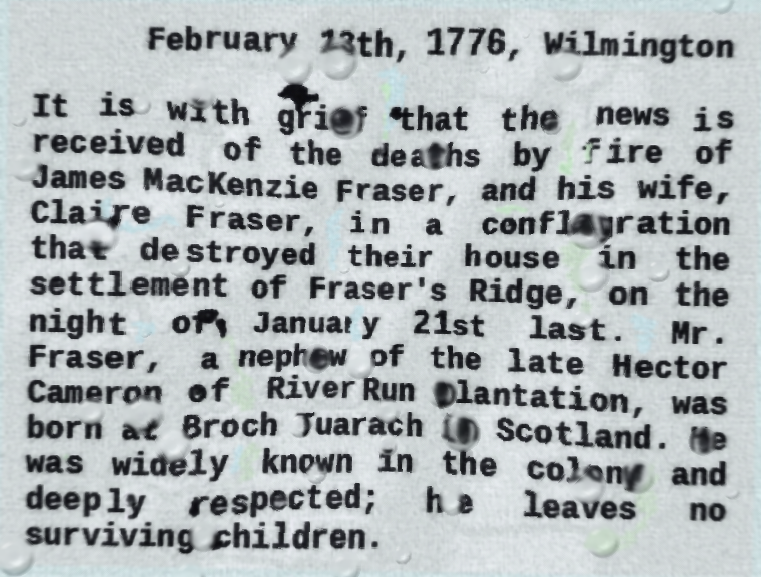
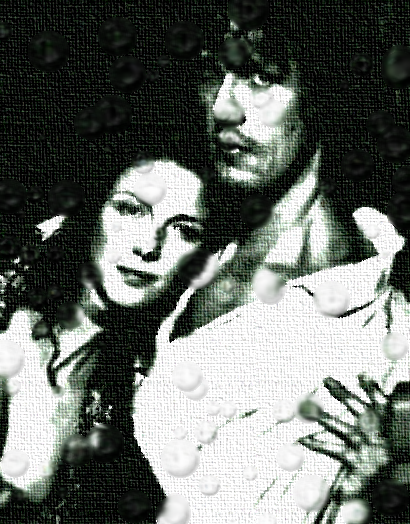
| The second significant change from the books is far more damaging. Brianna goes back in time not making the intelligent and strategic decision to change her name to Fraser (as indeed Roger, in the book, realises when he cannot find Brianna Randall in the passenger log books in Inverness, but finds 'Brian(a) Fraser' instead). Instead, in the television series, she becomes attached to her upbringing father and uses Randall. |
| This is done because the producers wanted to further use the evidently considerable acting talents of Tobias Menzies. So Brianna has a number of flashbacks once she's back in time, and further sees a 'ghost' of Frank at the Ayr quayside nodding his approval of her mission. |
| The most serious flashback in this context is to 1966, when Brianna (eighteen) half-reads a Wilmington Gazette report held by her father that says that sometime in the 1770s (precise date of 1776 in the book) Claire and Jamie die in a fire. This proves to Frank that his wife did go back in time and did meet the man she claimed to have married in the past. It matters to Brianna as a memory because Frank her father will not trust her to see the document directly and will only explain it later when she might understand it better. |
| She looks at the document. She did not know the significance of the names: James Fraser, Claire Fraser. She asked her father. The script also says she felt a lack of trust that he would not tell her. The script also says he came close to telling her, and had he done so it would have broken Frank's and Claire's agreement to say nothing at all about this past of Claire's. When he says one day she will understand, the teenager says that then she might not care. She recalls this memory as a significant moment when he did not trust her; if she recalled it here, why not earlier (in series 2:13 and 3:4-5)? |
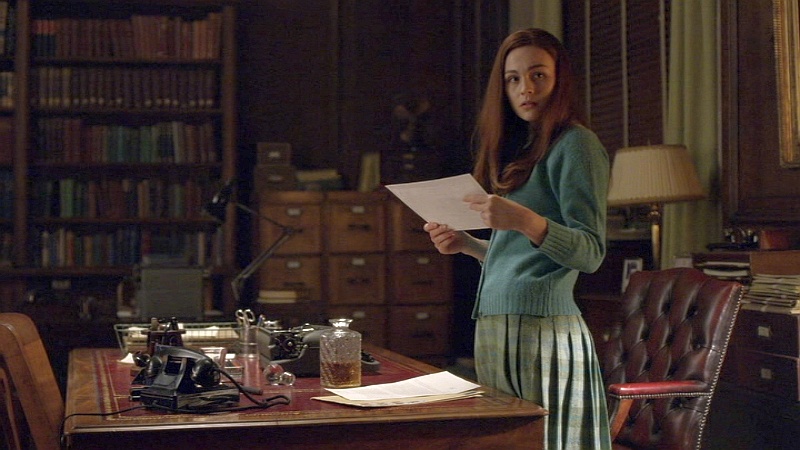
| What was the plot purpose of Brianna seeing the obituary notice on Frank's Harvard desk? If it was to prompt her to go back in time, why did she not remember it during all that document search in series 3 when the Fraser name was now known to her? |
| The whole obituary Frank knows - mentioned by Brianna to Claire in episode 9 - surely affects the whole documents search of 2:13 and 3: especially that they were not only in Frank's archive but in Mrs Graham's as well and in Brianna's memory. Claire in 1968 returned home to Boston with Brianna in 3:04 after a failed document search: yet 4:09 tells us that Brianna knew of a document obviously not mentioned at all in 3:04. And in 2:13 Brianna recalls a letter in her father's document box as significant if not understood. So why not this? |
|
Roger discovered this death by fire report in the Wilmington Gazette not in Oxford, as in the book, but in the manse: via Fiona, from her granny Mrs Graham's archives. "That is research from a colleague in Scotland," Frank tells Brianna in 1966. The danger here is that if Mrs Graham received this notice before 1948, then her series one conversation with Claire, after she is through the stones, and tells Claire not to pursue a ghost, is not warm, helpful advice, but that of a hypocrite. If she discovered the obituary afterwards, then she obviously kept it to herself. (And why would she discover such an obituary: why was she chasing a ghost?) FIONA: Granny used to help the Reverend with his research. I have some of her papers that I came across when Ernie and I were unpacking. ROGER: An obituary? FIONA: Aye. This, Roger: "It is with grief that the news is received of the deaths by fire of James Mackenzie Fraser and his wife in a conflagration that destroyed the home on the settlement of Fraser's Ridge." The date's smudged: 21st of January, 1770-something. |
| So what was information discovered by Roger in Oxford (in an obscure song book) and by Brianna on holiday in Jamaica, and therefore out of the way in terms of the plot, becomes something they surely should have found in Claire's, Brianna's and Roger's quest to find out what happened to Jamie after Ardsmuir. It is, in part, already in Brianna's mind. |
| In series 2, in the attic, when Roger and Brianna discovered archives like Frank's and Caire's wedding (register office in the series, Catholic church in the book), and Claire being away taken by the fairies, why didn't they find the obituary notice? Because, of course, the Outlander series writers hadn't thought of that then. But it will have been in the reverend's diary for 1966, and surely in his box marked 'Randall'. |
|
But it's worse than this. Fiona's granny had died. Fiona's desire to wed Roger had gone, and she married Ernie instead. She discovers her granny's archive only when unpacking to move in the manse sold to them. (In the book the manse cannot be sold.) The series two and three documents search wasn't only extensive, including in the attic (TV - in he book archives are in the garage), but it was also done with Fiona present. So Fiona didn't bother to look in her granny's archive, for a document easily found when unpacking. Come on! The TV writers have set up a problem that did not exist before. This is what the literary author James Blish (according to critic Damon Knight, In Search of Wonder, 1952-1955) and film critic Roger Ebert have called an idiot plot: here, a memory told in series 4 should also be told in series 3 in that Brianna fails to open her mouth and Fiona fails to look in her granny's archive as others search extensively. But there is no time travel for the Outlander series writers. |
| Note that in the book, neither Frank Randall nor Mrs Graham has anything to do with Roger or Brianna separately discovering the obituary notice, where it has a clear date for the newspaper. |
| It also recolours the 1966 conversation Frank has with Claire in season three that he wants a divorce, after previously declining the offer from Claire. His divorce is now not because Claire failed to keep her promise to forget Jamie, but instead because he knew she would go back. This is information denied to the viewer - because the writers hadn't thought of it at that point! |
| Frank hopes that Brianna will come with him to England. That divorce conversation includes him admitting that Brianna did not know of his plan to leave Boston and return to England. So he goes out, the car crashes and he dies. So we all assumed in season three that Brianna never knew he wanted a divorce, and so season two's and season's three's documents search for Jamie is done without that knowledge. So in season four's flashback there is a very limited window when he can ask Brianna to come with him: in between that divorce argument with Claire and the crash, and therefore the conversation with daughter Brianna happens in the car. |
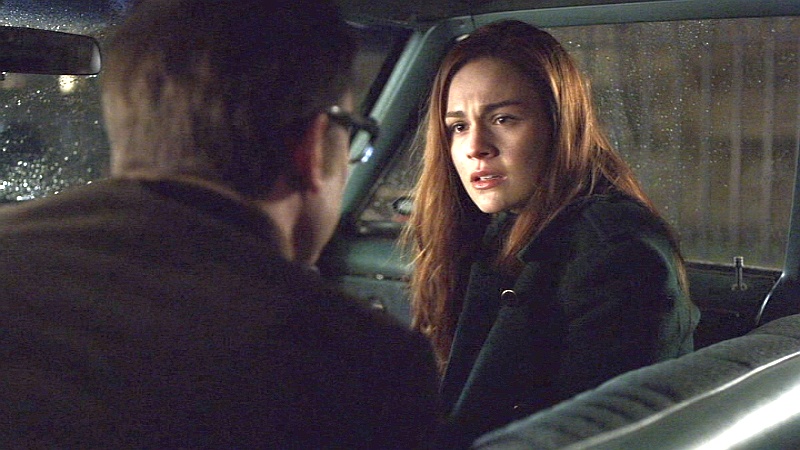
| Brianna in the car is dismissive of his plan and the divorce. In Book 3 Frank's plan was earlier, before she finished school. It is in January 1966, and the car skids on ice. This television version is after she finishes school, and so the reason for the crash is unclear. Did he commit suicide in despair because his beloved daughter dismissed the move to England and the divorce? This question should never even have been opened by the writers without providing an answer. |
|
Then, back in time, in Wilmington itself, after Roger and Brianna meet, handfast and make love, they fall out instantly on Roger's failure to tell Brianna that he had known of the death report. But he did attempt to tell her: he telephoned. The dialogue is muddled and bears all the signs of trying to have it both ways. BRIANNA: You weren't supposed to come here. That wasn't the plan. ROGER: What, and you call tearing off into bloody nowhere a plan? No, I would've told you. BRIANNA: I just I didn't know where we stood after the last time we talked. ROGER: What do you mean, you didn't know where we stood? You didn't know how I felt about you? Let's go outside. BRIANNA: Roger, wait. How did you even know where I was? ROGER: I spoke to Gayle. She told me you were going to visit your mum. So I went to find you in Inverness [Note again: this is when Roger was ringing to tell Brianna about the obituary notice!] BRIANNA: You read my letter. ROGER: Of course I read your letter. And that's all I got? A letter? You could have called me. [Brianna went without telling Roger] BRIANNA: I wanted to call you, but I didn't know how to tell you that I love you, and I thought that if I told you I was coming here, you'd try to stop me. Later on, after the lovemaking, we get this: ROGER: (SIGHS) Don't be angry, but I did know. I found the same obituary. BRIANNA: After I left? ROGER: No. Before. BRIANNA: And you didn't tell me? ROGER: I almost did. But (SIGHS) You were so happy when I told you that your parents found each other. I couldn't bear making you sad again. BRIANNA: You found out my mother died, and you didn't think that I should know that? ROGER: At first, I did. I wanted to tell ye. Brianna there was no point breaking your heart. Even Fiona agreed. BRIANNA: Fiona? You talked to Fiona about this? About my mother and time travel? ROGER: That's how I found the obituary. Fiona had it, or her granny did. She was a caller for the dancers at Craigh na Dun. Fiona already knew about time travel, and she agreed that if I told you about the fire, it would do more harm than good. BRIANNA: Oh, she did, did she? She's the one you consulted about this and not me? And then the two of you decided that I shouldn't know that my own mother was dead? ROGER: She was already dead. You knew she was dead. She's been dead for 200 years. What could you do? BRIANNA: This. Roger, I could do this. But you didn't want me to. ROGER: Brianna, we have this gift, but we cannot be the arbiters of who lives and who dies, or we'd save all our loved ones. BRIANNA: That was my decision to make. I would never have done that to you, Roger. How dare you take that choice away from me? The result is that she ends up telling him to go: ROGER: Maybe I should just go back. BRIANNA: Maybe you should. ROGER: Is that what you want? For me to leave and return through the stones? BRIANNA: Turns out Lizzie and I do pretty well on our own. ROGER: Brianna, you told me about your last words to your father and how you've never forgiven yourself for leaving him like that. BRIANNA: Don't you dare bring my father into this. ROGER: It's the same thing. Can't you see that? Right when it matters, you're pushing me away. BRIANNA: Screw you! I was just a kid. ROGER: Well, you know what? You still are. You're acting like a child. Maybe this was a mistake. BRIANNA: Fine. If you really believe that, then you should go. ROGER: Look me in the eye and tell me, because if that's what you really want I will go. BRIANNA: No one's stopping you. All Roger had to do was repeat that he had rung Brianna to tell her. He thought she would be there to know it. Fiona knew because it was in her granny's archive. So this dialogue, earlier and later, is strained to death to make an outcome it cannot support. Why does Roger say this: "I almost did. But you were so happy when I told you that your parents found each other. I couldn't bear making you sad again."? He rang her up to tell her!!! It just does not work. |
|
The more one looks at this adaptation, the more it is a complete mess. The changes run the story into incredulity from the obituary notices with Frank, Mrs Graham and, likely, the reverend's archive. That the handfast marriage and their immediate separation is itself a documents misunderstanding is easily explained on simpler dialogue. And, after all, they'd just made married for a year and a day and made love. Were they so easily able to descend into separation on a muddled conversation? This part is a mess not within the story but in the adaptation writing. This is also what the critic Roger Ebert has called an idiot plot and it lacks credibility. It is broken completely by a simple conversation. |
| Imagine if the documents so available had been found in the searching! Not only would Jamie's whereabouts after Ardsmuir have been instantly solved, but that Claire would have stared at a report indicating that he was alive, ended up in the colonies, that she found her way back to him and had apparently suffered her own death alongside him. |
| All the writers had to do was have the obiturary notice discovered in Oxford in an obsure publication and have Brianna find it in another out of the way place. But, no, they made her father have it and Fiona's granny as well. It became too easily available and in multiple copies. And then, Roger has a simple answer for Brianna's complaint: he did ring her. Yes, he waited but in the end he rang her: as he had already said. The whole narrative stream becomes ridiculous. |
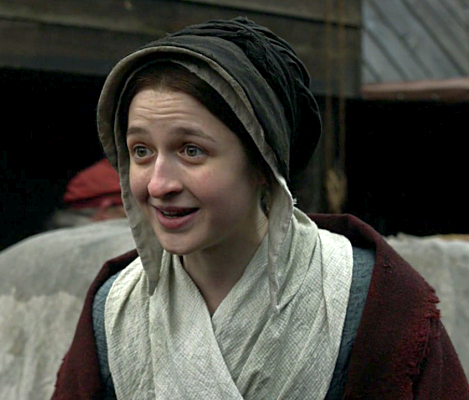
| This unguarded rewriting then has a further effect. Brianna at Ayr harbour saves a woman called Lizzie from a future of sexual bondage. In the book, picked up from Inverness, she is thirteen years old and suffers from frequent malaria fevers. In the television series she is an adult when saved from sexual bondage in Ayr. Brianna does advise her, although hardly from knowledge of eighteenth century custom. Yet season four's plot integrity is shot through by the new characterisation of Lizzie. |
| In season four some time passes slowly, as many events happen over a short time period. Others, like some journeys, either take a long time on screen or passed over rapidly. A journey from Wilmington to Fraser's Ridge should take ages, but passes in 4:09 rapidly, and we move from Jamie knowing Brianna for two weeks and then Brianna being two months pregnant. That's fine, except some of the conversations made later would have been made earlier. I am reminded of series 2:01 when Reginald Wakefield and Frank Randall say things that would have been said quickly, and yet the the reverend says, "It's been a week now," which is also an example of 'fourth wall talk' or speaking to the audience. |
|
Combine that with the television necessity of replacing the building of narrative evidence with a quickie statement: when Brianna says Lizzie has been "a good friend" to her.
She's a good friend, then, not a thirteen year old sickly burden in her care, allowing for some superior and inferior dynamic at the beginning. |
| What would good friends talk about? How about Brianna telling Lizzie at least of the handfasting, the marriage of sorts, and Roger, and the loss she's felt after the (silly) argument, and that Roger might even have gone back to Scotland? Even if she did not mention the rape, she could have said that the man Lizzie saw was her handfasted husband. In any case, Brianna does not have to say anything to Lizzie. Lizzie just has to listen. Lizzie is shown as being highly attentive to Brianna and well tuned-in. At fraser's Ridge she sleeps in the same room as Brianna, and intervenes in her dreams to waking state. |
| In the book, Lizzie reacts to the forward Roger when he meets Brianna. When Brianna returns from the handfasting and lovemaking, Lizzie the young teenager washes Brianna's clothes and notices the blood of the virgin. It is this that she reacts to. The rape of Brianna happens two days later, in Stephen Bonnet's ship. Lizzie understands that Roger is called MacKenzie, but by Brianna using his surname Wakefield Jamie thinks that Wakefield will likely marry Brianna properly and MacKenzie is the rapist. It is a thin plot device in the book. Roger gets a thumping, and only his claim that Brianna wanted to make love saves Roger from being killed by fists. |
| In the television series the rape is in the public house back room where Brianna and Lizzie are staying, and immediately follows the handfasting. This is Bonnet, once intended to be hung in Wilmington, and now playing cards in the pub in Wilmington. Really? So Lizzie the adult is responding to the rape, even though Brianna is paternalistic towards her and Lizzie acts the servant. She thinks that the man she saw meeting Brianna before the handfasting and lovemaking is the rapist. After this, Roger, who would return to Brianna, is forced by the same Bonnet in the pub to work in the ship until his contract ends. He leaves Brianna a note (rather than go upstairs and say, 'I have to go to the ship...'). After noon, Brianna reads the note and rushes to the harbour. The ship has gone on the morning tide - rather quickly. Lizzie meets Brianna at the harbour and Brianna had information on Roger to go there. Lizzie didn't? Brianna seemingly never tells Brianna what she was doing there, the sure opportunity to say that the man Lizzie saw, Brianna's Roger, has gone away on the ship. |
| Lizzie has come to say that Brianna's parents are in town: her mother had performed surgery at the theatre the previous night. Brianna finds her father, Jamie, and then mother Claire finds daughter with father. In the book father and daughter travel and meet Claire later. |
| After all these events in a short timescale in Wilmington, the time in the adaptation passes rapidly: two weeks become two months. And so we hear from Brianna that Lizzie has been a "good friend" because television cannot take time to demonstrate this. Perhaps Brianna isn't telling it like it is: but Lizzie is perceptive. |
|
Except that, even two months on, Lizzie remains in ignorance about the man she saw and about the handfasting.
This simply beggars belief. By changing the Lizzie character - older, taller, contemporary in one sense, and a "good friend" that later undermines the indenture relationship, surely Lizzie can know that the Roger she identifies to Jamie is not the rapist. Brianna might still keep very quiet about the rapist: her mother only knows because Brianna encountered Bonnet to get the ring (the other ring than the one in the book) and gives her mother the ring. |
|
So, not only is the rape a plot device, but so is the maintenance of Lizzie's ignorance. If you change the character, then over a longer period of time, the story must be changed. It wasn't and this maintained ignorance does not work. Guess what? This is yet again what the film critic Roger Ebert has called an idiot plot although in a variation called Could Have avoided This Plot: a simple conversation solves the problem; we assume it happened and yet it did not, but in this variation the idiot error is realised. In the podcast the writers claim that they strengthened the story from the book; in fact they did the opposite. |
| There is an alternative argument to this, presented to me, and it is that Brianna dismisses attempts of friendship made by Lizzie towards her. The adult Lizzie is still someone with whom Brianna does not want to confide. There is no scene where the friendship is accepted. Therefore Brianna never talked about Roger with Lizzie. The answer to this, I think, is in the medium of television: where the statement that Lizzie has been "a good friend" is made. It also comes in the pportrayal of Lizzie as perceptive and hands-on. The "good friend" statement is a summary statement to tell what we haven't seen over two months duration. Series 5 nees to tell us why Brianna has been so unconvincing as a character when she has studied history and is an engineer. We get no sense of her intelligence at all. Event after event, and her crass reactions, have diminished Brianna's character and we end up relying on statements such as Lizzie being a good friend from someone who seemingly doesn't do subtlety and nuanced conversation. Compare this with Frank as a character, for example, where he shows the strains and stresses of what he knows and how much he can say to a daughter who is going to make life-changing discoveries. The teenage character of Brianna shown there does not seem to have matured later. And as soon as Lizzie knows this simple fact, that Roger was the one who handfasted, the whole basis of the plot crashes. |
| Then, although Brianna's forward nature regarding sexual activity (though a virgin) is a shock to her eighteenth century father, Roger does not save himself after completing his ship work by his reporting consent, as in the book, but is saved from death by Jamie's fists only due to a passer-by coming along a nearby road. Roger is barely allowed to speak in the television episode: if he gave his name the plot crashes. Roger is thus taken away on a cart by Ian and ends up in the trade of Indians. Roger is then transported hundreds of miles away, as a reject of his own people, leading to long travel for rescue by Jamie, Claire and Ian, and therefore Murtagh takes Brianna and Lizzie to River Run where her aunt tries to find her a husband and where Brianna ends up giving birth. |
| On my argument, Lizzie should have identified Roger as the one who'd handfasted with Brianna. The only person who could have identified the real rapist, besides Brianna, is her mother, and her mother kept quiet as she had the ring before Jamie went out and clobbered the wrong man. (On the matter of the ring, how much better it would have been for Bonnet to have stolen the gold ring, as he did in the book. Brianna, now made clearly to be so attached to the memory of father Frank, would be even more motivated to rescue that gold ring, instead of having the change of ring simply to allow the series to introduce the ring of the book as well as the Lallybroch ring in its earlier series one change.) |
| The alternative may have been to hire an actor in her teens to play Lizzie, but presumably there are plans for Lizzie. Sophie Skelton played a Brianna at 16, and that's about the youngest she could go. The girls playing younger Brianna were in and out. So they made Lizzie older, changing the character, and that has implications for the story. |
| So, they seem in the series to divert off with Lizzie and then try to shoehorn the original story back in. Lizzie's fever seems very occasional, perhaps to help explain her own disappearance from narrative moments. In the book the fever is repetitive to slow down Brianna. |
| Another point might be very contemporary. The rape scene is heard but not seen. There must have been a lot of sensitivity among the writers about this rape scene given present identity politics and abusers in the media and in the political world. Apparently the scene was filmed and not used' (It's not in the deleted scenes!) If this is correct, this is a different motive for concealment from artistic effect. The actors might not be too pleased. If you are going to do it, then have the courage to show it. More than the book, the television episode shows Brianna traumatised. And if she is traumatised, and internalising a disaster, then this has to be maintained. Does she show this when she meets Jamie? |
| The book and the television series has Bonnet in too many places. He is in Wilmington early on when he steals Claire's ring. In the book he steals the ring from Frank, in the television series he steals the ring from Jamie. This allows Jamie to give Claire a ring that resembles the one she received in the book. |
| Then Bonnet is in Inverness Harbour and takes on Roger as a shipmate. He does dastardly things on the boat. |
| Then Bonnet is in the pub, when Brianna spots him playing cards with her mother's ring. This is despite him being a wanted man. Brianna is raped in the back room, or at least is considered a prostitute wanting payment of a ring. |
| He is, I suggest, a cartoon ethic Irishman as a thief; indeed, one reason for dropping the Irish family that robbed Brianna as she came through those relocated stones was that there were too many Irish being labelled as thieves. |
| The use of Bonnet also shows over-reliance on coincidences. One can allow for one or two, but the later episodes of series three showed far too many, and then did not stop in series four. |
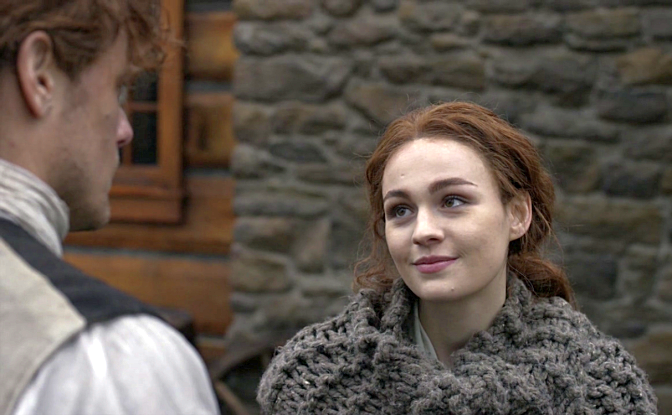
| Roger is supposed to be a History Professor (no less) at Oxford (no less). (Er, apparently Diana Gabaldon misunderstood English academics and downgraded him in a later book.) Some of his attitudes were 1950s, but at no point should he become an idiot. One cannot be an Oxford intellectual without being an intellectual: it does actually shape self-presentation. He calls himself an idiot for returning to the Mohawk when he could have recovered back in the future via a set of stones. |
| Surely he could say, 'Wow, this is amazing, to be here, to see it for real!' The Roger character seems to have changed. If you are a historian, you think according to schools of historiography, with the whole debate about primary sources. he should behave like he has landed at the most significant primary source, earlier time itself. He can labour on a ship because he once laboured before, in the books. He was in the herring industry on ships. But being an Oxford Professor is a culture of the mind. Frank himself never stopped being intellectual. |
| Brianna is made to look silly from the moment she came through the stones. She had one sandwich only and seemed somewhat lost. She should at least have shown fascination with the settlement buildings, in Wilmington, consistent with her interest in architecture. We get none of this. |
| In general, the arguments between Roger and Brianna in the book retain their sense of attachment. In the TV series the emphasis is on their separating each time: that the modern girl who wants sex clashes with the old man who wants marriage. What motivates book Roger in the early part is his sense of attachment, and it is only implied later on in the TV series where his chance to go back to the future via some humming stones is turned down. The shower scene, that he only imagines, does not explain anything and is audience manipulation. He could have gone to the future and returned to pursue Brianna: his explanation for being recaptured does not suffice. |
| There are elements in the books that would have been pleasing seen on television. The disappointment is about inconsistences within the TV series (singular and plural). |
| Television as a different medium forces variation. But some scenes are sad to lbe lost. Why did they not have Brianna go in trousers on a hired horse to Lallybroch, even if Jenny was elsewhere? They could have shown cultural dissonance in attitudes (not just a liking for early Led Zeppelin) and made more of it. Why not have Roger look at records of passengers in Inverness with a Fraser/ Randall variation, even if she remembers her father? Many people were saddened that book scenes of Jamie and Claire at the baby's birth were skipped. In a compressed timeline, this was to show the length of the return trip from the Mohawk to River Run. |
| Murtagh's existence is the major difference, yet it looks like he is being used to fill another role (Duncan), and thus trying to stay closer to the book. |
| They did not take advantage of divergences with Murtagh living and Lizzie being an adult: instead they forced the old story on changed characters and even compounded itthe difficulties thus relying on ignorance, stupidity, and an inability to be clear about recent memories. |
| What was lost was the romance between Jamie and Claire, even allowing for them getting older. There is still setting up in a new land and that can be romantic. |
| Another problem of television adaptation is continuity. Frame to frame early on shows the forest in different seasons. One minute deciduous leaves are on the trees, next they're off and on the ground, next back again; there is wetness all around, then it's dry, wet, cold, warmer... |
| I suggest that in adaptations there is a kind of group-think or even bunker mentality (as seen in politics) in which the arguments are made among writers about specifics, and in that gathering it is easy for someone not to do the simple overview tasks: asking, 'Is this consistent?' |
| When the map was produced, and it looked good, and it supported a choice of Ayr over Inverness, so that there was no scene of Roger checking passenger lists, did anyone who first said, 'That's a good map from the art department,' seek, then, to ask whether the location of the stones was compatible with the past episodes and series and even Roger leaving from Inverness? |
| When Roger and Brianna had their argument so instantly after the handfast lovemaking, did anyone ask whether this is consistent with how this all came about regarding his telephoning Brianna? Perhaps they did, because the dialogue is so strained to meet the objective of separation. He did ring her after all! |
| Diana Gabaldon's books are already quite different from the Frank story in the TV series, where the presentation of Frank is more rounded and sympathetic, but in extending his story regarding the obituary notice, not a matter for him in the book, did no one ask whether this was compatible with events so far presented? When a novel withholds information from the reader about which the novel and narrator is aware, this is manipulative writing. Thus: season three looks like manipulative writing, except this was unknown at the time until they wrote season four! They didn't manipulae the viewer, they rather did not think through all the implications of what they called "retrofit" writing. |
| In January 2019 there was a very interesting programme on BBC 4, showing that the Highland gathering and games around Grandfather Mountain in North Carolina is not based on the old Gaelic system but is a derivative of the Royal based games of Braemar. The American gathering was revived in 1956 and is the 'American Braemar'. As everyone knows, after Culloden and the banning of Highland symbols, the British Royal family adapted these symbols into a chocolate box derivative. The idea, therefore, that Highlander culture was preserved elsewhere, such as in the shadow of Grandfather Mountain, is simply false. The Highland Games as a gathering there is an 'invented tradition' - about which there is a good sociology, that is why and how these things come about. And in Scotland it was about the British Royal and Aristocratic elite gaining legitimacy by inventing roots in Scottish rural culture that it did not possess, and this is what the Americans have also produced. |
| Also in January 2019 there was an equally interesting programme on BBC 4 about the people who suffered on the tiny rotting ship The Hector, the first immigrants from Scotland to Nova Scotia. Such migrants the more 'capitalist' landowners wanted to keep, as the clan system morphed into that system. The second wave were the distrusted Scots from North Carolina etc. after the American War of Independence. They came to still a colony of the UK. The third wave were Scots and Irish forced off the land, the actual economic clearances - thus not following Culloden directly. However - invented tradition again - the Scots culture of Nova Scotia as in the capital Halifax was that of the 1928 tourist industry and its first fake gathering, because outside Cape Breton the Scots were a minority. The Indians, of course, who helped the first Scots survive, ended up the bog losers. |
| This is the question of whether the TV series could not have gone all-out with its variation, and located Outlander in Scotland for the struggle to live twenty years after Culloden and cut out series three episodes 9 to 13 and the coincidence-driven over-speedy events of the West Indies. The fictional Frasers might then have struggled in Scotland like the real folk did, while in post-Culloden oppression the Campbells acted as government agents over the Fraser lands. Perhaps then Claire, Jamie and others could have left for America, as so many did. Or Jamie himself might have become a capitalist landlord. He might have lost his land and lived in Edinburgh, say, until the 1770s when, as in the real world, Simon Fraser Lord Lovat received back his ancestral land. |
| Instead, in coincidence of circumstances Young Ian got taken by the ship and thus began what (in my opinion) was a terrible story of coincidences and people popping up again all over the place. |
| As for series four, the challenge really would have been to cut out the rape altogether, and have people respond to misunderstandings between the twentieth and eighteenth century and make more of relationships by characterisation. |
| There is the Heracleitus quote (the philosopher of change) that 'character is destiny'. |
| The Outlander novel and TV series is rather coincidence and event driven, and it has the following effects - especially as the TV series diverges from and then tries to force back events relating to the book. Instead of Jamie being the King of Men he ends up looking like a passive wimp and then a violent thug; Claire instead of being resourceful and strategic in the situations seems arrogant and impulsive (reactive) with her arms folded; Brianna is an engineering graduate and fiesty, but becomes closed-in and constrained; and Roger, the intellectual historian, with an adventure for life, is turned into a disliked idiot who just faces violence all the time. |
| If the characters had driven the plot, you would have seen Roger marvel at being in the past and taking in 'primary data' unlike anyone else in his profession; Brianna would have been fascinated with the townscape and how things worked, and both would have regretted the loss of modern conveniences (there was a little bit of this); Claire would have taught adaptability to her daughter; Jamie would have laid out strategy and protection. We would have seen actions based on the similarities and differences between Scotland and North Carolina (and not simply in setting up home). The only individual that seems to be character driven is Lord John, but then may be Lord John is too Lord Johnish - and he is all over the geography as well. |
| Plots relying on maintained ignorance turn the characters into chess pieces being pushed around. |
| There is no doubt that what people 'love' are Jamie and Claire, and then, secondarily, Brianna and Roger. So, therefore, the enriching story would be the one that focuses on those characters, for which the plot is the means to know them. Instead, via overuse of coincidence, misunderstanding, and characters popping up here, there and everywhere, the characters become boxed in and unable to shine and develop. Stephen Bonnet as the new Black Jack Randall, is too cartoon-like. He is Mr Evil with a stereotype ethnicity. He'd be better off in a Batman film. The audience and reader like to be fed a rich and fulfilling diet, not a succession of fatty burgers. |

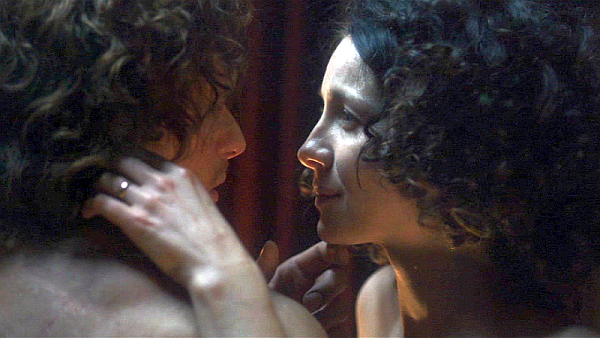
| There are high production values and the acting is very good. But is this enough, when key parts of the plot fail? Is it enough, when characters have been constrained or contradicted? The result is like when you take an exam: you are happy that you have passed (entertained) but see that you didn't get the higher or highest grade. Season 1 got an A+, season 2 got an A (a few Bs in spots), Season 3 got a B+ for over half of it with touches of A and then a D- for 9 to 13, and this one looks like a C+ and a B in parts. |
| The future writing must focus on the characters; it is the characters that people love. Series five might explain the idiot plots by having a point where Claire tells Brianna and Lizzie to stop being idiots and start talking, as she was aware of her own idiot plot regarding not speaking of the rapist to Jamie. This sort of 'lampshade hanging' is also available after the event, even if it is an admittance that something went wrong. |
| The writers will have to be strategic about the next two series, which are set to be made, assuming they retain core actors. I cannot see there being as many series as there are books (ten intended), and therefore it is time for the TV series to start going their own way, so that they can finish on series 6 or continue as the case may be. The talented actors might not want to become typecast, so there is a limit to the number of TV series that can be made. |
| The adapters are going to have to compress the books. One reason it might not reach ten series is because the new series fail to get enough new viewers to replace those who inevitably fall off - for example, how many operations does Claire have to do before people say she's done that so often before? |
| So the writers might do well to start introducing completely original stories. For example, if Claire, never mind Roger and Brianna, had cause to return to the future; or, maybe, Joe Abernathy has cause to come back in time and meet the rampant and structural racism of the time beyond the close circle of his hosts. |
| One of Outlander's great successes, I think, is the generation of a 'universe' that surrounds its characters, for example the Jacobites as people in the geography of the Highlands of Scotland. It can inspire a greater investigation of actual history. They tried this in series four but the slaves, Indians, settlers and landscape did not fuse together in the same way as characters did with Scotland in the landscape and historical buildings. |
| But one needs to be careful. The portrayal of religion in Scotland was very inadequate. Gabaldon's own Catholic bias distorts the actual cultural universe of the time. After John Knox, and the Protestant Reformation, Roman Catholicism went into steep decline. The Church itself that predominated was split into a purer Presbyterianism and Episcopalianism. The Restoration of the Monarchy in England affected positively the approval of bishops around 1660, and it was the bishops who were pulled in two directions when in 1690 the fully formed Presbyterian Church came into being - with the bishops cast out into their own Church. Some bishops were loyal to the Crown, and some were non-Jurors or Jacobites as were. 1712 is the significant date here for loyalty to the Corwn rewarded with recognition. In England, toleration was to do with denominations, in Scotland it was about the bishops in a different Church, who'd felt cheated out of the National Church. |
| Series four still involved religion; it even had theological themes of redemption through helping others. But it lost the connection with the Church: one minister of religion was an informant but not central. The Catholic priest expressed not "the finer points of catholic doctrine" (Roger) but a heresy when he thought he was too sinful to baptise a child. The moral standing of the celebrant does not affect the worthiness of the sacraments: basic Catholic doctrine. One point of going to America was an intended freedom of religious practice versus the coloniser's Church of England. The fact that Catholicism was over-represented in Series one meant that in series and book four the expected liberation of religion wasn't a contrast. Series five and six could introduce such a religious liberation theme; the Quakers may well be relevant, as in the books. |